"Spying is disgusting for a gentleman"
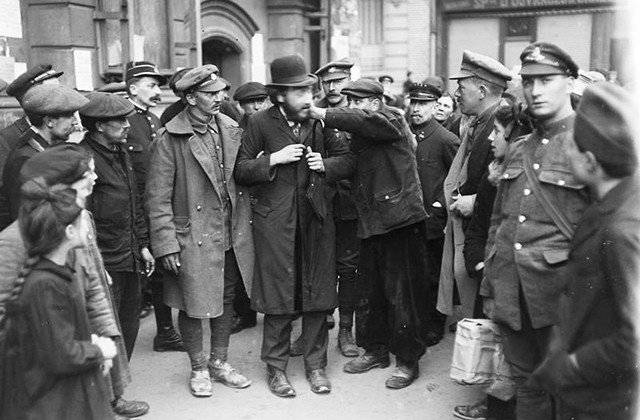
How did the participants of the First World War learn the art of intelligence and counterintelligence?
The current heroic and romantic halo around their profession, special forces officers are obliged to the First World War. Different ways of secretly collecting information - that is, intelligence, if this is done by “our own”, and espionage, if “other's” - existed since ancient times, but have always been considered marginal and shameful, unworthy of noble people. The total prolonged war of survival forced the government and ordinary people to overestimate this craft - stolen secret information or, conversely, thrown in misinformation could sometimes cost hundreds of thousands of lives of compatriots and the outcome of major battles. It was during the First World War that secret agents working under the guise of merchants, priests, or even dancers, became a model for the education of patriotism. It was then that the first “legends” of espionage appeared, like Mata Hari, and cultural figures like Somerset Maugham, who later devoted a separate cycle of stories to this, successfully mastered the profession of a spy.
"Dirty business"
Before World War I, not only in Russia, but also in almost all European countries, there was a widespread tradition to despise even his native gendarme as a “vile spy and scammer” and not to give him a hand in a decent society. In Russia, by the end of the 19th century, the gendarmes themselves were considered unworthy to engage in “clowning”, which is why they usually went to meet with informants right in shape, at best, putting on a coat, but still wearing boots and spurs. Than even casual public was very happy.
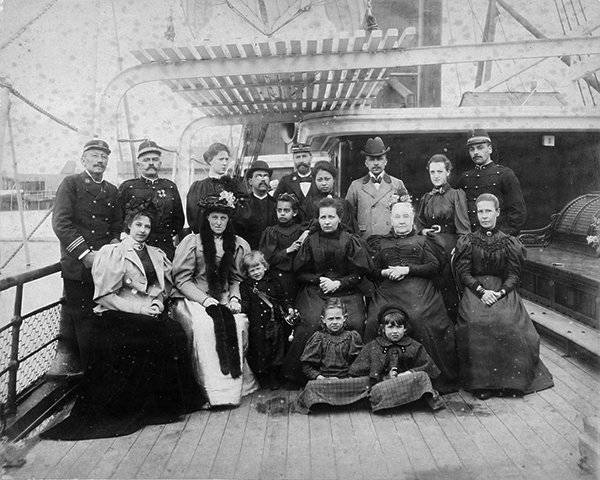
High-ranking British military also considered espionage a dirty business. Even during the Crimean War, an English officer, Kingsleick, wrote: "The collection of information by secret means is disgusting for an English gentleman." General Douglas Haig emphasized: “I would not like to let my people be used as spies. Officers must act honestly and openly, as the English should be. "Spying" among our people was hated by us, the military. "
Even the Germans, whose intelligence took shape even before the war and was at first considered the most effective, did not favor spies. “In Germany, they understood that for this specific, necessary, but at the same time, despised occupation, special people are needed. Your ideal spy is a man with criminal motives, a kind of moral pervert, ”wrote the British historian James Morton.
The “broad masses” also shared contempt for the spies. Belgian Martha McKenna, who worked for British intelligence during the First World War, later recalled her first thoughts when she started a conversation about espionage “for the good of the Motherland”: “I was immediately struck with horror. I knew that there are spies in Belgium and that they serve their country. But I still saw in them something alien to people and very far from my life. ”
During the war years, with the help of the Allies on the Entente in the German-occupied Belgium, an entire underground organization codenamed “White Lady” arose. The people who were in its ranks were engaged in precisely acquiring intelligence information, but they protested when they were called spies — they considered themselves soldiers and after the war demanded army ranks and awards.
German agents also did not like their “craft” deep down. The German military attache in the United States, Franz von Papen, who organized sabotage at military factories, once said at dinner: "My God, I would give anything if I could be in trenches at the front where I could do my job as befits a noble person." . But by the end of the war such ladies, who had not experienced special moral torments, were already engaged in such “work”.
Legend of Mats Hari
It so happened that it was the name of Mata Hari - the most famous among the scouts of the First World War. More than 20 feature films have been shot about her, including the famous melodrama with Greta Garbo. Although “Mata Hari” is not even a name, but merely the stage name of the Dutch dancer Margaret Gertrude Zelle. Yes, and about the effectiveness of her "work" is still being debated - whether she was a spy at all (if there was - then, most likely, very mediocre).
By the beginning of the war, Mata Hari was an adult (37 years) woman with an unhappy fate. Having survived the death of loved ones, an unsuccessful marriage with the sea captain-alcoholic, and then the death of her own son, she tried to find solace in the study of the culture and traditions of the peoples of Indonesia, where fate brought her. Having mastered the local dances perfectly, Margaret moved to the then epicenter of Bohemia - Paris, where she performed as an exotic dancer.
Here she was waiting for success. Soon, Mata Hari became a real "star", but not because of high art, but because of the outrageous onlookers. Some of her dances were something close to modern striptease, which was still unusual in popular culture. Mata Hari also came up with a number of legends about herself - one said that she was the illegitimate daughter of an English king and an Indian princess, another - that she was brought up in an eastern monastery, the third - that she has a horse to fly across the sky.
She did not disdain Mata Hari and the most ancient craft - she was the lover of a number of military, bankers and politicians in France, Germany and Belgium. Some rich fans sometimes lingered for a long time (for example, she lived for several months in the castle of a Belgian financier). At the same time, life remained impractical, in many respects a “big child.” Loosely lied, lost a lot of money in cards, often turned out to be aground and borrowed money.
Margareta Gertrude MacLeod-Zelle (sitting on the left) and her husband, Captain Rudolph John MacLeod, aboard Princess Amalia, probably in Southampton. 1897 year. Photo: Bruyn Prince CollectionMargaret Gertrude Macleod-Zellé (sitting left) and her husband captain Rudolph John Macleod aboard Princess Amalia, probably in Southampton. 1897 year. Photo: Bruyn Prince Collection
During the First World War, the Netherlands remained neutral, and Mata Hari could travel from France to her homeland and back. But since the countries were divided by the front line, the path was roundabout - through Spain and the UK. At the same time, in choosing favorites and admirers, Mata Hari switched to officers of the Entente countries (among whom was even Russian - Vadim Maslov), and this attracted the attention of French special services. Having taken a conversation with the intelligence captain Georges Lada, the dancer justifies herself, says that she owes everything to Paris and loves France more than even her Holland, but also loves officers. And in proof of sincerity he promises to get a German mobilization plan for a huge fee. However, on his way to the Netherlands, Mata Hari blinked out about his recruitment to the British, which leads to not even more suspicions.
As a result, she never got any plan, returning to France empty-handed, and Captain Lada presented himself as a complete idiot before the authorities to recruit a talkative and frivolous actress. It is believed that it was Mata Hari and killed - Lada was very offended at her and contributed to her arrest and execution. The formal reason for this was the interception of the radio exchange of a German resident in Spain with Berlin, in which a certain “agent H-21” was mentioned, who was told to return to Paris via Madrid.
13 February 1917, Mata Hari was arrested by French intelligence and charged with espionage. She was tried by a closed court (the materials of which have not been declassified so far), accusing of transferring to the enemy information about the movements of the Allied troops, allegedly received from lovers. The petition for clemency to President Poincaré was rejected: Mate Hari was also unlucky with the time of her trial, which coincided with the failure of the attack at Chemin de Dame. The losses of the French there approached thousands of 120 and provoked a mutiny in the army, strikes in factories. A scapegoat was urgently needed, which would explain to the French that they were simply betrayed.
She was shot 15 October 1917 of the year, but even from her death, she made a presentation - refused the blindfold and sent a kiss to the shooting soldiers. “The prostitute is yes, but the traitor is never,” she allegedly said goodbye, standing at the firing post.
Walter Nicolai, who headed German Intelligence during the First World War, later wrote that Mata Hari was indeed recruited by the Germans and formally was a spy, but did not harm the French: “No, there was no judicial error. The verdict was correct and consistent with wartime. But the tribunal mistakenly thought it had dealt an irreparable blow to German intelligence. In fact, no report of the agent "H-21" was used, none of her message was of political or military importance to us. That's why her fate is tragic — she risked her life in vain. ”
Another specialist in German intelligence, Fritz Carl Regels, takes a different view: “Mata Hari brought great benefits to Germany. She was a courier in the chain of agents in Europe. She brought them money, checks, orders, received information and transmitted most of it herself. She was well versed in a military environment, having completed her training in one of our best intelligence schools. It was a real scout who served the interests of Germany. Perhaps this is the solution to the courageous behavior of Mata Hari before the shooting - she was dying like a soldier who did her duty. ”
"White Lady"
November 22 The British, French and Belgian intelligence agencies decided to set up a common intelligence bureau in Folkestone in the south-east of England. It was supposed to coordinate the work of all the agents of the Entente in occupied Belgium and in neutral Holland. The work was not always smooth - the officers of the three armies vied for success and blamed each other for failures, recruited agents from each other.
British agent Henry Landau later talked about the tasks of the bureau: “At all costs, we wanted Holland to remain neutral, because even if she entered the conflict on our side, the Germans would immediately occupy her.” In relation to Belgium, the work for which local patriots were recruited seemed, at first glance, boring. “In the cinema, spies commit desperately bold acts, such as stealing military secrets from the ambassador’s safe,” wrote the historian James Morton. - In fact, espionage mainly consists of routine trifles. A great success of intelligence was the organization of monitoring the movement of trains, which allowed the Allies to learn about the movements of the German troops in a timely manner.
There were two problems with observing the trains. The first was the collection of information, and the second - its transfer to the headquarters. Suitable personnel were relatively easy to find among Belgian refugees, who were usually run by elders or priests from a displaced community. The task of the intelligence officer’s corps was to convince the priests to provide him with information about the identity of those members of the community who could monitor the railways in Belgium - mostly either living in houses adjacent to the tracks or having an excuse to stay near the road.
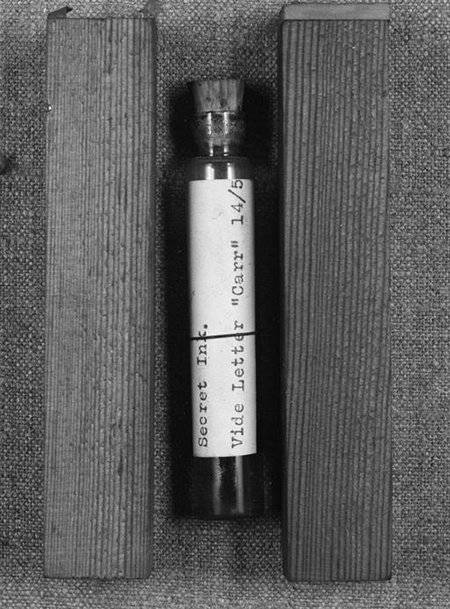
After recruitment, the future agent studied in Paris under conditions of great secrecy. The training consisted of a short course on the German army, in order to be able to determine the type of troops and military units by buttonholes, shoulder straps, cockades and helmets, and also know different types of trains. For example, an echelon for the transport of infantry included few horse-drawn carriages, but on the platforms at the end of the train there were field kitchens; the trains for the transport of cavalry consisted almost entirely of carriages for horses; the artillery trains had guns on the open cargo platforms. Train watchers were also to notice the general appearance of the troops, clean or dirty, and the state of their morale. And if you drove from 40 to 52 trains a day, this meant moving the division. ”
The spy network, created with the help of allies, called itself “The White Lady” - after the name of the legendary ghost who had predicted the fall of the Hohenzollern dynasty. The work of the organization was coordinated by that same Henry Landau, and Edward Emable, a priest from the village of Irson, became his deputy. He managed to organize round-the-clock monitoring of the movement of trains along the line along the front. A long-standing friend of Emable, Felix Latush, his wife and two teenage daughters, whose house stood along the paths, sat at the observation post. They tracked who and what was transported in passing trains, using chicory to count horses, beans for beans for soldiers, and coffee beans for guns. The reports were hidden in the hollow broom handle, which the contact had to change for another.
Other members of the organization wrote their reports with a magnifying glass on very small pieces of very thin tissue paper, then they either rolled it inside a cigarette (to light when it was dangerous) or carried it out of the cork “in the body cavities” in small containers. Agent Paul Bernard, his colleagues argued, could have written 1500 words on the back of a postage stamp. Also, hollow handles in baskets of greenswomen and hollows, hollowed out in beet root crops, were used to transmit messages. Messages were taken to the border with neutral Holland, and then thrown over barbed wire or dragged through a hollow barrel. To transfer people through the barrier (and the Germans also passed electric current through the wire), some agents put on thick rubber gloves and boots, or crawled through the barrel too.
For all, at first glance, the comicness of such a "partisan", it was very dangerous - the Germans exposed and shot some agents. For example, among the young women who helped the “guides” were Leoni Rameloo and Emily Shatteman, who lived in the village of Bouchot on the Dutch border. In September 1917, the Germans caught them and executed them. But most of the agents were never exposed, and by the end of the war, the White Lady was considered the most successful intelligence network on the Western Front.
In secret around the world
The agents of the Entente in the Austro-Hungarian area of responsibility were even more creative in their secret business. “Many spies were arrested during our advance on the Russian front,” Max Ronge, who led counterintelligence first and then intelligence of the dual monarchy, wrote in his book Intelligence and Counterintelligence. - After the occupation of Lviv by Russians, unemployment forced many to turn into spies or serve in the Russian police. Many [after the offensive of the Austrian troops] left with the [retreating] Russians, but Fadeus Gulkovsky was captured and convicted with a certain number of petty spies. ”
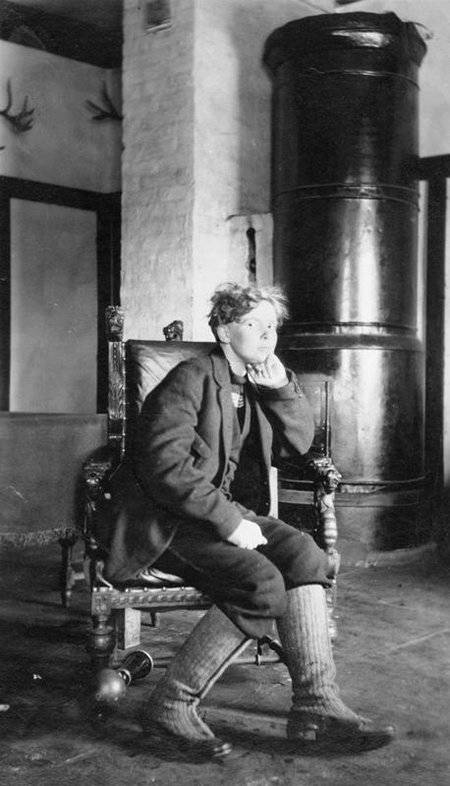
Nevertheless, it was extremely difficult to fight the Russians, Italian and French spies remaining on the territory of Austria-Hungary. Ronge describes how, for example, they mastered the transmission of their messages in full view of the whole of Austria-Hungary: “The danger was represented by newspaper ads. Who could have imagined something special in the announcement: “The Swiss, 35 years old, knows the accounting and correspondence very well, has worked in management positions in Vienna for a long time, has excellent recommendations.” We found that this announcement to the Italian intelligence service reported the following: "The 35-I infantry division from Vienna headed in the direction of Italy." Czechs based in Switzerland used weather reports and wedding announcements. Spies used innocent articles, feuilletons and notes in newspapers to convey information, and in addition, incomprehensible signs that someone inscribed on train cars ... ”.
The Austrian counterintelligence agents were able to unravel the newspaper channel of communication between spies only by the fall of 1918, and they managed to discuss the issue of such announcements by persuading the publishers to “filter” them. But the spies of the Entente countries simultaneously developed another communication channel - through the Catholic Church. “Even the Vatican’s embassy in Vienna allowed the sending of private letters in its diplomatic mail, not realizing that this seemingly private correspondence contained spy correspondence,” recalled Ronge. “The letters of a high-ranking ecclesiastically detained by us led to the discovery, to which the special attention of the embassy was paid.”
Mandate for the CIA
In April, 1917 was the prototype for the now almost all-powerful CIA, which served as a small office in Washington, which consisted of two officers and one clerk, and abroad many military attaches worked with him on their own initiative and even paid most of their expenses from their own pockets.
“The US government that saved us from the war allocated 1917 thousands of dollars for [11] exploration this year. The army has entered into a hurricane of great war blindly, "- writes in the book" American intelligence in the years of world war "her former employee Thomas Johnson. However, according to his own confessions, after only a few months, the situation has changed dramatically. There were already a few dozen agents working for American intelligence in Europe, from the careless-looking military to the secular ladies.
“One of the best maneuvers of the intelligence division of the American headquarters and at the same time the most clever joke ever played, by one army against another, was“ Alsatian cunning, ”Johnson writes. - With the Machiavellian cunning of the Germans, they warned of a major American offensive on Alsace that was being prepared; this offensive was supposed to have been brought to the Rhine, whereas in reality the Americans were preparing for an offensive in another area. Colonel Conger had a brilliant idea how to misinform the Germans. He wrote a letter [to the Commander of the US Expeditionary Forces in Europe] to General Pershing, in which he outlined a plan for the alleged attack in Alsace, and threw a copy of this letter into the waste basket in his hotel room, among whose servants were suspected to be a German spy. When Conger returned, the copy disappeared.
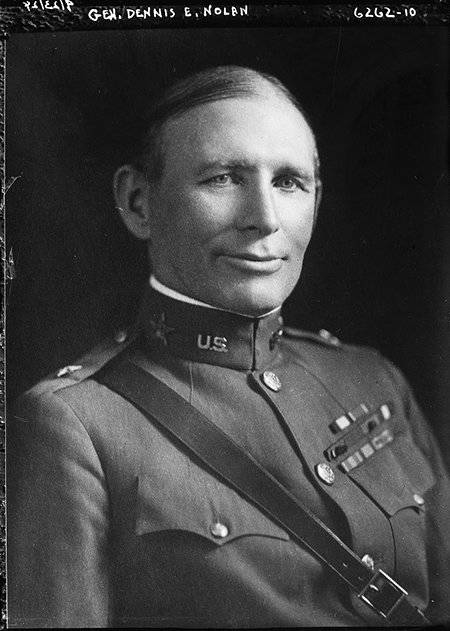
A few days later, the head of the German secret service in Switzerland began to receive reports: “X. and Z., who are suspected of being American agents, have visited all the libraries, all the booksellers of Bern in search of information about Alsace. They were interested in geographic and topographical details, railways and highways. ” Geographical and topographical details, information about railways and highways — that was exactly what the invading army should have known. ”
Also in the disinformation of the Germans was involved in the famous German Americans nicknamed "Beladonna", who worked in Switzerland, in the Bern hotel. As Johnson said, one day her boss summoned her and reported that the Americans might be preparing an offensive in Alsace and should try to verify this information. Soon, a spy in her hotel was able to “pick up” an American officer who was allegedly passing by, and lured him to a bar. According to the version set forth in Johnson’s book, she interviewed an American and, after searching her pockets, found an envelope with the order of the head of the American intelligence, General Nolan, the head of the American secret service in Switzerland to send him all who were in his service people who were in Alsace or knew the country and spoke in Alsatian dialect. After that, the Germans began to send fresh reinforcements to Alsace, but the American offensive began in a completely different place. Johnson, in his book, claims that it was in the end that “finished off” Kaiser Germany, although here, obviously, the author gives vent to the imagination that special services are no less characteristic of fishermen than of fishermen.
Information